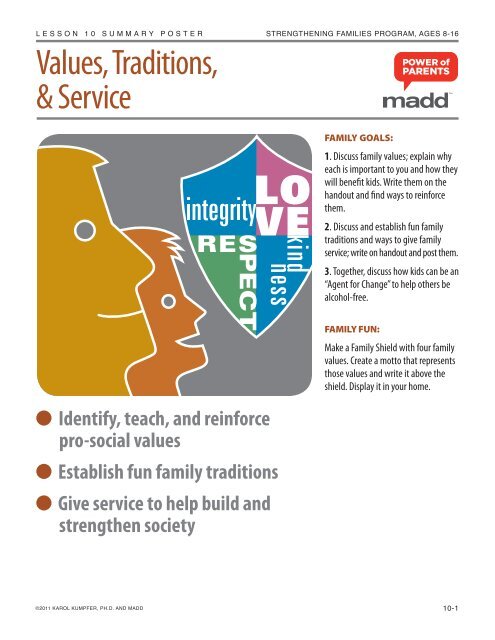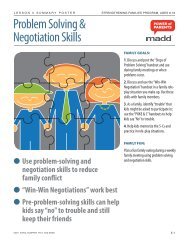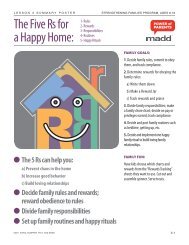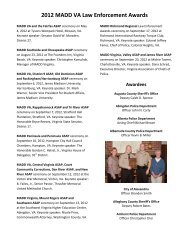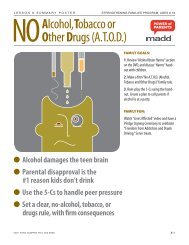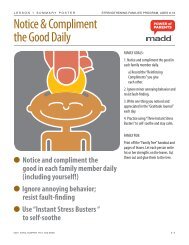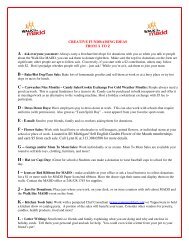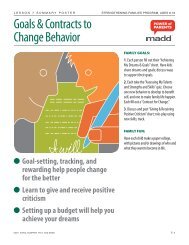Values, Traditions, & Service - MADD
Values, Traditions, & Service - MADD
Values, Traditions, & Service - MADD
You also want an ePaper? Increase the reach of your titles
YUMPU automatically turns print PDFs into web optimized ePapers that Google loves.
LESSON 10 SUMMARY POSTER<br />
STRENGTHENING FAMILIES PROGRAM, AGES 8-16<br />
<strong>Values</strong>, <strong>Traditions</strong>,<br />
& <strong>Service</strong><br />
FAMILY GOALS:<br />
1. Discuss family values; explain why<br />
each is important to you and how they<br />
will benefit kids. Write them on the<br />
handout and find ways to reinforce<br />
them.<br />
2. Discuss and establish fun family<br />
traditions and ways to give family<br />
service; write on handout and post them.<br />
3. Together, discuss how kids can be an<br />
“Agent for Change” to help others be<br />
alcohol-free.<br />
FAMILY FUN:<br />
Make a Family Shield with four family<br />
values. Create a motto that represents<br />
those values and write it above the<br />
shield. Display it in your home.<br />
l Identify, teach, and reinforce<br />
pro-social values<br />
l Establish fun family traditions<br />
l Give service to help build and<br />
strengthen society<br />
©2011 KAROL KUMPFER, PH.D. AND <strong>MADD</strong> 10-1
LESSON 10 STRENGTHENING FAMILIES PROGRAM, AGES 8-16<br />
Fun Family <strong>Traditions</strong><br />
Creating and celebrating happy family memories<br />
Family traditions are ways of celebrating events or happenings that help kids have fun and feel a sense of identity, belonging, and connectedness.<br />
Tradition celebrations can happen once a year, like a family reunion or a holiday celebration, or take place on a monthly or weekly basis like a monthly<br />
Sunday dinner with relatives or a Friday night family board game. A monthly “Give Back to My Community” day of service—either by helping elderly<br />
or needy neighbors, helping the less fortunate, or picking up trash in the neighborhood park—helps kids develop empathy and respect for their<br />
community. A tradition can also be a “family cheer” to celebrate a success, like good grades; or a group hug for making it through a hard day. These<br />
regularly performed activities make family life more predictable, add a sense of stability, and are important for kids’ emotional health. Regardless of<br />
how your family decides to celebrate or serve, it’s all about happy, healthy togetherness.<br />
Below, list the weekly, monthly, and yearly traditions that you enjoy and ask: “Are our family traditions adequate to produce happy family bonding?”<br />
and “Do they reinforce our values?” If not, how can you make them more meaningful? Would it be helpful to create a new family tradition? What<br />
events would you like to celebrate? Write down your ideas. And while you’re at it, think of ways to make good health part of your on-going holiday<br />
traditions by including physical activity, healthy foods, and new healthy ways to fix traditional foods.<br />
Our Current<br />
Family <strong>Traditions</strong><br />
New or Improved<br />
Family <strong>Traditions</strong><br />
Some Ideas to Get<br />
You Thinking<br />
• Friday family game night<br />
• Reunion with extended family<br />
• Religious holidays – add service to deepen<br />
meaning<br />
• National holidays: add meaning like hanging<br />
“Blessing Leaves” on Thanksgiving “Thankful Tree”<br />
• Picnic celebrating summer<br />
• Birthday dinners / breakfasts<br />
• Sunday dinner with relatives<br />
• Friendship day: invite neighbors<br />
• Independence Day – make a collage of gifts<br />
freedom provides<br />
• Make “Welcome Baby” book<br />
• Father-son outing<br />
• Daddy-daughter date<br />
• Monthly lunch date with Mom<br />
• Saturday special breakfast<br />
• Memorial Day: celebrate your heritage learning<br />
of ancestors<br />
• Celebrate Grandparents Day with service,<br />
a meal (if they live near) or coupon to a<br />
restaurant<br />
• Celebrate Mother’s/ Father’s Day with “service”<br />
coupons<br />
• Write love notes of things you like about each<br />
other on Valentine’s Day<br />
• Celebrate wedding anniversary by doing your<br />
own “circle of love”<br />
• Hold a monthly “<strong>Values</strong>” night<br />
©2011 KAROL KUMPFER, PH.D. AND <strong>MADD</strong> 10-2
LESSON 10 STRENGTHENING FAMILIES PROGRAM, AGES 8-16<br />
Shield Your Family by Sharing Your <strong>Values</strong><br />
Design a shield and create a motto highlighting your most important values<br />
<strong>Values</strong> are attitudes about life that determine our thoughts and<br />
actions. Pro-social values—that benefit self and society—help kids make<br />
good decisions and feel happier. Write the values that matter most to your<br />
family on the shield. Some to consider are: • Ambition • Charity • Chastity •<br />
Cheerfulness • Civility • Conscience • Cooperation • Courage • Creativity •<br />
Empathy • Esteems Education • Fairness • Forgiveness • Frugality •<br />
Generosity • Gratitude • Hard Work • Honesty • Humility • Integrity •<br />
Kindness • Love • Loyalty • Makes Restitution • Optimism •<br />
Patriotism • Peacemaker • Respects others • Responsibility •<br />
Responsible Sex • Self-Control • Self-Motivation •<br />
Self-Reliant • Self-Respect • Serenity •<br />
<strong>Service</strong> • Tolerance • Respects Nature •<br />
A motto is a brief statement that captures the values, beliefs, and<br />
aspirations of an individual or family. For hundreds of years, families<br />
have created mottos and put it on their family shield or crest to let<br />
themselves and others know what they stood for and aspired to. Some<br />
examples of family mottos are: “All for one and one for all;” “In difficulty,<br />
win by patience;” “When the going gets tough, the tough get going;”<br />
“We are strong with love.”<br />
As a family, thoughtfully develop a motto and write it in<br />
the banner on the shield. Enjoy designing, coloring<br />
and being creative with your family shield<br />
and then post in a prominent place.<br />
©2011 KAROL KUMPFER, PH.D. AND <strong>MADD</strong> 10-3
LESSON 10 STRENGTHENING FAMILIES PROGRAM, AGES 8-16<br />
I Can Contribute<br />
Recognize society’s benefits and begin now to give back<br />
Like the air we breathe, the benefits we get from society are so prevalent that we often take them for granted. That’s especially true for kids, who naturally begin life a<br />
bit self-centered. It is our job as parents to help them realize that so much of what they enjoy was paid for by the work and sacrifice—even the very lives—of those<br />
who came before them. But these benefits come with a cost—we and our children are expected to pass on a stable, orderly, and well-maintained society to the next<br />
generation. Parents need to help kids come to a realization that they have an obligation to protect and build society; that they have the capacity within themselves<br />
to become a positive “agent of change” in their family, with their peers, and even their community. When kids are awakened—not only to a sense of duty, but of<br />
empowerment—anti-social activities like joining a gang, or buying drugs that empower and pad the pockets of criminals, are no longer enticing.<br />
Help your kids make a list below of all the benefits they enjoy from society. Then write down the anti-social activities that tear down or harm society. Include<br />
the ripple effect of things such as using drugs, tagging others’ property, cheating on taxes, not voting, or drunk driving. Then discuss and brainstorm what you<br />
and your kids can do to make society stronger—one brave personal choice at a time.<br />
What Blessings or Benefits<br />
Does Society Provide Me?<br />
What Anti-Social Behavior<br />
Harms Society?<br />
What Can I Do to Make<br />
Society Stronger?<br />
Did you know? Many of the problems we face as a society have their roots in underage drinking, since it often spawns drug use and other<br />
criminal behavior. Here are some research-proven environmental strategies to help prevent it: 1) Increase alcohol taxes and use in prevention programs.<br />
2) Require registration and tracking of beer kegs. 3) Support social host laws that penalize adults who host underage drinking parties.<br />
4) Support the age 21 law. 5) Study “environmental factors” that promote healthy alcohol use in a community, including limiting liquor licenses and<br />
hours of operation, (For more tips: go to www.madd.org/powerofparents and download the parent handbook on preventing underage drinking, p. 43.)<br />
©2011 KAROL KUMPFER, PH.D. AND <strong>MADD</strong> 10-4
LESSON 10<br />
STRENGTHENING FAMILIES PROGRAM, AGES 8-16<br />
Keeping the Changes We’ve Made<br />
5 simple ways to strengthen families and keep your kids safe from addiction<br />
If you’ve followed these 10 Lessons, you’ve found great improvement in your children’s behaviors and family relationships. But life gets busy at times, and when<br />
we feel a time-squeeze we need to know and do the essentials. Here’s an “essentials” list to help you keep the changes you’ve made and prioritize your efforts to<br />
help keep your children on the right track towards a safe, healthy, happy, and productive life—safe from alcohol, drugs, and anti-social behavior.<br />
1. Communicate with “LUV” and Understanding.<br />
Use “LUV-Listening” and “I-Messages”, and avoid C-Boulders. (Lesson 2)<br />
2. Have “My Time.” Daily one-on-one play time with each child, where<br />
you focus<br />
on giving<br />
positive<br />
attention<br />
and compliments. (Introduction Lesson)<br />
3. Use the Positive Disciple model and<br />
Social Rewards to change behavior.<br />
Focus on the positive and ignore minor misbehavior. (Lesson 1 and 4)<br />
4. Hold a<br />
weekly<br />
“Family<br />
Meeting.”<br />
(Lesson 2)<br />
5. Monitor your kids and their friends to<br />
see that they stay in an alcohol and<br />
drug free social environment. (Lesson 8 and 9)<br />
©2011 KAROL KUMPFER, PH.D. AND <strong>MADD</strong> 10-5
LESSON 10 STRENGTHENING FAMILIES PROGRAM, AGES 8-16<br />
Pro-Social Skills for a Successful Life<br />
Building brain power with values and skills<br />
These values and skills will arm your children with life-long habits that are highly respected, valued in the workplace, and create personal satisfaction.<br />
HOW TO<br />
TELL<br />
THE TRUTH<br />
1. Look at the person.<br />
2. Reflect on your commitment to tell the truth.<br />
3. Answer questions honestly, saying exactly what<br />
happened.<br />
4. Don’t leave out details to misrepresent what<br />
happened.<br />
5. Admit to mistakes; offer to make amends.<br />
HOW TO<br />
DEVELOP<br />
COURAGE<br />
1. Recognize that fears are generated by thoughts.<br />
2. Keep your self-talk positive (“I can do this....”)<br />
3. Decide on your values, why they are important to<br />
you.<br />
4. Be willing to take hardship or persecution.<br />
5. Respectfully speak up when you see a wrong done.<br />
HOW TO<br />
SET<br />
AN EXAMPLE<br />
1. Be humble; recognize everyone has worth.<br />
2. Resolve to live true to your values.<br />
3. Work hard to excel in an area.<br />
4. Be kind and friendly to everyone.<br />
5. When faced with a choice between a “low road”<br />
(anti-social behavior) and a “high road” (pro-social<br />
ways), always choose the “high road.”<br />
6. Encourage friends to do the right thing.<br />
HOW TO<br />
BE AN<br />
AGENT OF CHANGE<br />
1. Notice something in your home, school, or community<br />
that needs to be changed.<br />
2. Research and talk to others about it.<br />
3. Decide on a plan of action.<br />
4. Talk to friends and get their support.<br />
5. Present your idea to those in charge; work to make<br />
it happen.<br />
©2011 KAROL KUMPFER, PH.D. AND <strong>MADD</strong> 10-6
LESSON 10<br />
Role-Play Slips<br />
Learning by doing<br />
STRENGTHENING FAMILIES PROGRAM, AGES 8-16<br />
WHAT: Role-playing is a form of kinesthetic learning—learning that takes place doing a physical activity, rather than<br />
listening to a lecture or watching a demonstration. It helps wire new behaviors into the brain.<br />
HOW: Two family members pick a “situation” slip and pretend to be those persons—portraying what they would<br />
actually do in that particular situation if they were those people using the newly learned skills. Start out with our easy<br />
slips, and then write your own role-play slips featuring your family situations. After kids practice role-playing the<br />
skill, observe how they do in real life. If they have trouble with the skill, it means they need an “Attitude-Switch” (to<br />
believe the skill benefits them), more role-play sessions using “Positive Practice” and rewards, and consistent negative<br />
consequences when they don’t. (See Lessons 3, 4, and 7.)<br />
KIDS: Use these slips or make up some of your own to practice valuable Social Skills presented in this lesson.<br />
KIDS: Your friends are talking about tagging<br />
people’s property with spray-painted designs.<br />
What could you say?<br />
KIDS: A group of popular kids are making fun<br />
of another person. What are you going to do<br />
about it?<br />
KIDS: You overhear a bully threaten another<br />
kid if he doesn’t give up his lunch money. What<br />
will you do?<br />
KIDS: You overhear some girls spreading<br />
rumors and gossiping about another girl.<br />
What can you say?<br />
©2011 KAROL KUMPFER, PH.D. AND <strong>MADD</strong> 10-7


